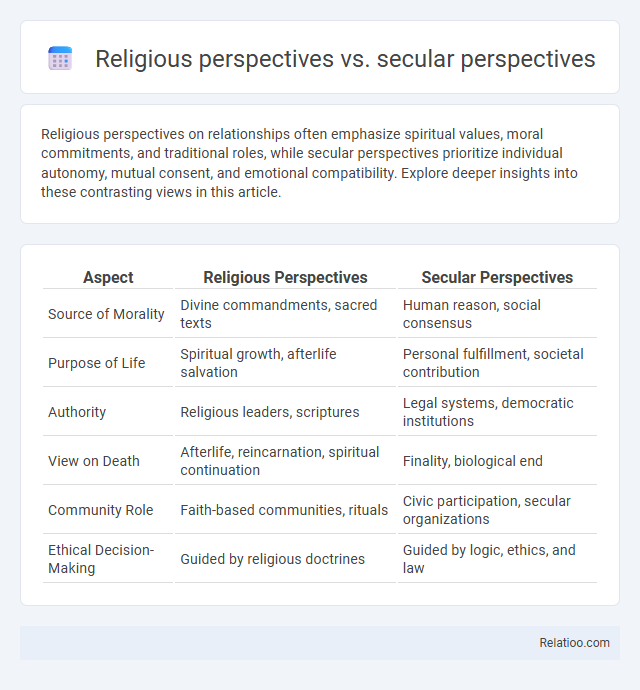Religious perspectives on relationships often emphasize spiritual values, moral commitments, and traditional roles, while secular perspectives prioritize individual autonomy, mutual consent, and emotional compatibility. Explore deeper insights into these contrasting views in this article.
Table of Comparison
| Aspect | Religious Perspectives | Secular Perspectives |
|---|---|---|
| Source of Morality | Divine commandments, sacred texts | Human reason, social consensus |
| Purpose of Life | Spiritual growth, afterlife salvation | Personal fulfillment, societal contribution |
| Authority | Religious leaders, scriptures | Legal systems, democratic institutions |
| View on Death | Afterlife, reincarnation, spiritual continuation | Finality, biological end |
| Community Role | Faith-based communities, rituals | Civic participation, secular organizations |
| Ethical Decision-Making | Guided by religious doctrines | Guided by logic, ethics, and law |
Defining Religious and Secular Perspectives
Religious perspectives on same-sex relationships are typically grounded in scriptural interpretations and doctrinal teachings that often define marriage as a union between one man and one woman. Secular perspectives emphasize individual rights, equality, and personal autonomy, supporting the recognition of same-sex relationships based on human rights frameworks and legal equality principles. Defining religious perspectives involves analyzing faith-based moral codes, while defining secular perspectives requires understanding legal, ethical, and sociocultural norms independent of religious doctrine.
Historical Context: Religion and Secularism
Historical context reveals that religious perspectives on same-sex relationships often arise from doctrinal teachings and scriptural interpretations rooted in ancient cultures, shaping moral frameworks across societies. Secular perspectives emerged notably during the Enlightenment, emphasizing individual rights and scientific understanding, leading to increased advocacy for LGBTQ+ equality. The ongoing dialogue reflects a shift from traditional religious authority toward pluralistic, legal recognition of same-sex relationships in many modern states.
Core Beliefs: Faith vs Reason
Religious perspectives on same-sex relationships often rely on core beliefs rooted in faith, viewing morality through sacred texts and divine commandments, which can emphasize traditional gender roles and marriage definitions. Secular perspectives prioritize reason and empirical evidence, advocating for equal rights and acceptance based on human dignity, psychological research, and social justice principles. The tension between faith-based doctrines and reason-based ethics shapes ongoing debates about legitimacy, acceptance, and legal recognition of same-sex relationships worldwide.
Morality and Ethics: Divine Command vs Humanism
Religious perspectives often view same-sex relationships through the lens of divine command theory, emphasizing adherence to sacred texts and moral codes believed to be ordained by a higher power. Secular perspectives prioritize humanism, focusing on individual rights, equality, and ethical principles derived from human reason and empathy rather than supernatural authority. Understanding these frameworks helps you navigate the complex morality and ethics debates surrounding same-sex relationships in different cultural contexts.
Interpretations of Life’s Purpose
Religious perspectives on same-sex relationships often interpret life's purpose through the lens of divine commandments and spiritual fulfillment, emphasizing traditional roles and moral doctrines. Secular perspectives prioritize individual autonomy, human rights, and personal happiness, viewing life's purpose as self-determined and inclusive of diverse sexual orientations. The divergence in interpretations highlights the tension between faith-based values and contemporary understandings of identity and love.
Approaches to Science and Knowledge
Religious perspectives often interpret same-sex relationships through doctrinal beliefs that emphasize moral teachings derived from sacred texts, influencing their approach to science by prioritizing faith-based knowledge over empirical evidence. Secular perspectives, conversely, rely on scientific research and social sciences to understand same-sex relationships, emphasizing evidence-based conclusions that promote inclusivity and human rights. Your understanding of these relationships can benefit from recognizing how religious approaches might resist certain scientific findings, while secular views advocate for knowledge grounded in observable data and human experience.
Social Values and Community
Religious perspectives on same-sex relationships often emphasize traditional social values that prioritize heterosexual marriage and family structures, influencing community norms through faith-based teachings. Secular perspectives tend to advocate for equality and inclusivity, promoting acceptance and legal recognition of same-sex relationships as integral to social justice and human rights. Communities reflecting secular values typically foster diversity and pluralism, supporting same-sex couples through inclusive policies and social support systems.
Governance: Theocracy vs Secular States
Religious perspectives on same-sex relationships often influence theocratic governance, where laws are based on religious doctrines that typically restrict or prohibit such unions. In contrast, secular states separate religion from governance, promoting equal rights and legal recognition for same-sex couples through civil legislation. This divergence creates varying legal landscapes worldwide, affecting marriage equality, anti-discrimination laws, and social acceptance.
Conflict and Dialogue between Perspectives
Religious perspectives on same-sex relationships often emphasize traditional doctrines rooted in sacred texts, frequently framing homosexuality as morally impermissible, which leads to significant conflict with secular viewpoints that advocate for equal rights and acceptance based on human rights and empirical social research. The dialogue between these perspectives involves attempts to reconcile faith-based values with secular principles of equality, where interfaith and human rights organizations engage in discussions to reduce stigma and promote coexistence. This ongoing conflict and dialogue reflect broader societal tensions around identity, moral authority, and the evolving understanding of human sexuality in pluralistic societies.
Bridging the Divide: Toward Mutual Understanding
Religious perspectives often emphasize traditional values and scriptural interpretations that define same-sex relationships differently from secular views, which prioritize human rights and personal autonomy. Bridging the divide requires open dialogue that acknowledges both faith-based convictions and secular principles, fostering empathy and respect without compromising core beliefs. Mutual understanding emerges through educational initiatives, interfaith collaborations, and inclusive policies that honor diverse experiences while seeking common ground.

Infographic: Religious perspectives vs Secular perspectives
 relatioo.com
relatioo.com